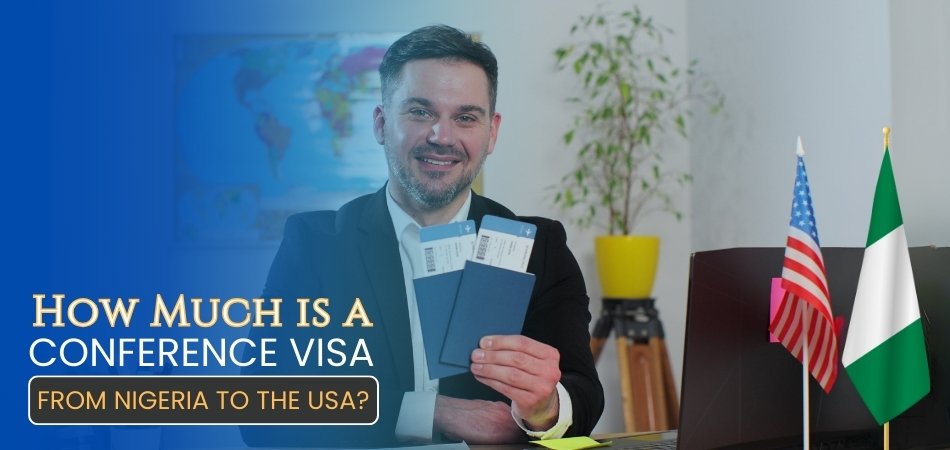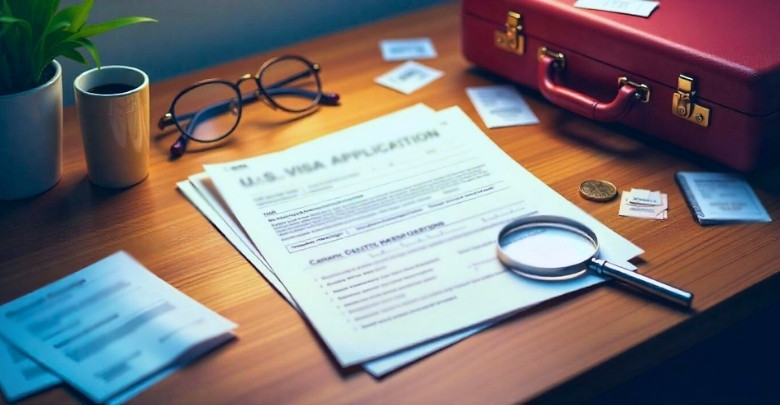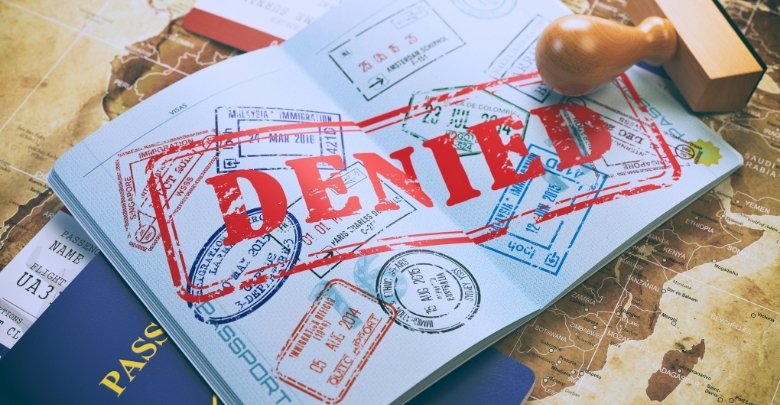Planning to attend a conference in the U.S. comes with several expenses, and the visa cost is one of the most important ones to consider. From application fees to supporting documents and travel costs, every detail matters. Many applicants are often surprised—how much is a conference visa from Nigeria to the USA?
The standard application fee for a U.S. conference visa (B-1 Business Visa) is $185. However, additional costs may apply, such as visa issuance fees, document preparation fees, and possible expedited processing charges. Travel expenses, including flights and accommodation, also add to the total cost. Estimating these expenses in advance helps applicants plan better and avoid unexpected financial burdens.
Are you curious about the full breakdown of costs for a U.S. conference visa? This article provides a detailed look at all the fees involved, including application charges, travel expenses, and extra costs you may not have considered. Keep reading to ensure you have a clear budget before starting your visa application process.
Want to Know How Much is a Conference Visa From Nigeria to the USA?
When planning to attend a conference in the U.S., knowing about the visa fees and associated costs is essential. The cost of obtaining a U.S. conference visa from Nigeria can vary depending on several factors. Knowing these costs upfront helps you plan your budget effectively. Here’s a breakdown of the main costs involved in getting a U.S. conference visa.
Visa Application Fee
The standard visa application fee for a U.S. conference visa, specifically the B-1 Business Visa, is typically $185. This fee applies to most non-immigrant visa categories, including those for attending conferences. The fee is non-refundable, even if the visa is denied, so it’s essential to apply carefully. Be sure to pay this fee before scheduling your visa interview.
Additional Administrative Fees
In some cases, additional administrative fees may apply based on the type of visa and processing requirements. For example, certain applicants may need to pay the visa issuance fee, which can vary depending on the applicant’s nationality. This fee is determined after the visa interview. Being aware of these potential fees helps you avoid unexpected expenses when planning for your trip.
Costs Related to Supporting Documents
While the visa application fee is the primary cost, there are also costs associated with gathering the required documents. This includes obtaining certified bank statements, proof of employment, and other necessary documents like an invitation letter for upcoming conferences in USA. Depending on the documents required, applicants may need to pay for notarization or translations, which adds to the total cost of obtaining the visa.
Travel and Accommodation Expenses
Apart from the visa costs, you also need to account for travel and accommodation expenses. The cost of flights from Nigeria to the U.S. can vary greatly based on the season and how far in advance you book. Accommodation costs will depend on the location of the conference and your preferences. Planning ahead for these expenses ensures that you can attend the conference without financial strain.
Additional Costs for Expedited Services
If you need to expedite your visa application due to tight timelines, there may be additional fees. These expedited services can speed up the processing time but usually come with a premium charge. If you’re planning to attend a time-sensitive event, such as upcoming conferences in USA, consider whether the expedited service fee fits your budget.
Travel Insurance and Contingency Funds
Travel insurance is also an important expense when planning your trip. While not required for visa approval, travel insurance ensures you’re covered in case of medical emergencies, trip cancellations, or delays. Additionally, having contingency funds for unexpected expenses while traveling can prevent financial difficulties. It’s always best to be prepared for any unforeseen costs during your conference trip.
Total Estimated Costs for a U.S. Conference Visa
In total, the cost of obtaining a U.S. conference visa from Nigeria can range from approximately $185 for the visa application fee to additional costs for documents, travel, accommodation, and possible expedited processing. It’s essential to factor in all of these expenses when planning your trip. Being aware of the total cost helps you avoid financial surprises and ensures that your visa application process goes smoothly.
The cost of a U.S. conference visa from Nigeria involves several fees, including the application fee, administrative costs, and travel-related expenses. By planning ahead and understanding the full scope of costs, you can ensure that you’re well-prepared to attend your desired conference.
Are There Any Hidden Fees When Applying for a USA Conference Visa?
Applying for a U.S. conference visa involves more than just the standard application fee. Many applicants overlook additional costs that may arise during the process. Hidden fees can come from administrative charges, document preparation, and even travel expenses. Awareness of these extra costs helps applicants budget effectively and avoid unexpected financial burdens.
Visa Issuance and Reciprocity Fees
While the standard visa application fee is $185, some applicants may be required to pay an additional issuance or reciprocity fee. This fee varies based on the applicant’s nationality and the agreements between the U.S. and Nigeria. It is usually determined after the visa interview. Checking the U.S. embassy website beforehand helps applicants know if this fee applies to them.
Document Processing and Notarization Fees
Applicants often need to submit various supporting documents, such as proof of employment, financial statements, or invitation letters. Some of these documents may require notarization, which comes with an extra cost. In cases where official translations are needed, translation services add to the expenses. Properly preparing documents in advance can help reduce last-minute spending.
Travel Costs for Visa Appointments
Scheduling a visa interview requires traveling to the U.S. Embassy or Consulate, which may not be located near the applicant. Transportation, hotel stays, and meals for those coming from different states add to the overall expenses. These travel costs can be significant for applicants from remote areas. Factoring in these expenses ensures better financial planning.
Flight Ticket and Travel Insurance Expenses
Once a visa is approved, the next major expense is booking flights and securing travel insurance. The ticket price from Nigeria to the USA varies depending on the airline, season, and how early it is booked. Purchasing travel insurance is also recommended in case of trip cancellations or medical emergencies. These costs must be included in the total budget.
Expedited Processing Fees
In situations where applicants need their visas processed quickly, expedited services may be required. Some applicants pay extra for early appointment scheduling or faster document verification. These premium services are not always necessary, but they can be useful for those with urgent travel plans. Applying early helps avoid the need for expensive expedited processing.
Unforeseen Expenses and Contingency Funds
Unexpected costs can arise at any stage of the visa application or travel process. These may include additional embassy requests for documents, last-minute travel plan changes, or currency exchange fees. Having contingency funds ensures applicants can cover any extra charges without financial stress. Proper budgeting helps avoid difficulties in the final stages of preparation.
Can Your Employer or Conference Organizer Cover the Cost of Your USA Visa?
Attending a conference in the U.S. can be expensive, and many applicants wonder if someone else can cover the cost. Some employers or conference organizers may provide financial support, depending on their policies. This assistance can include visa fees, travel expenses, or accommodation. Learning how sponsorship works can help applicants explore funding options.
Employer-Sponsored Visa Fees
In some cases, employers may cover visa costs for employees attending professional conferences. This is more common when the event aligns with company goals or professional development. Employers may reimburse visa fees, pay for travel expenses, or provide an official letter of support. Confirming sponsorship details with the employer in advance is essential.
Conference Organizers Offering Financial Support
Certain conferences provide financial assistance to selected participants. This support may include waived registration fees, travel grants, or funding for visa-related expenses. Organizers usually offer sponsorships to speakers, panelists, or researchers presenting at the event. Checking with the conference administration about available funding options can be beneficial.
Requirements for Sponsorship Approval
Employers or conference organizers may require applicants to meet certain criteria before approving sponsorship. This can include proof of conference registration, relevance to job responsibilities, or a commitment to share insights after the event. Providing a strong case for why the conference benefits both the individual and the organization increases the chances of financial support.
How to Request Sponsorship
Applicants should formally request sponsorship through a well-structured email or letter. The request should highlight the importance of attending the conference, the estimated costs, and how the event aligns with professional growth. Employers may have specific policies regarding financial assistance. Submitting a detailed and professional request improves the chances of approval.
Covering Additional Travel Expenses
Even if an employer or organizer covers visa fees, applicants may still need to fund other expenses. Costs such as meals, transportation, and personal expenses may not be included in the sponsorship. It’s important to clarify which costs will be covered before making travel arrangements. Proper budgeting ensures applicants can afford the entire trip.
Alternative Funding Options
If an employer or conference organizer does not provide full sponsorship, alternative funding options can be explored. Some professional associations, academic institutions, or grant programs offer travel funding. Applicants can also consider company reimbursement policies after attending the conference. Researching available funding sources increases the chances of receiving financial assistance.
Can You Get a Refund if Your USA Conference Visa Is Denied?
Applying for a U.S. conference visa involves a non-refundable application fee. Many applicants wonder if they can get their money back if their visa is denied. Unfortunately, visa fees are non-refundable, regardless of the decision. Understanding the reasons behind this policy and what applicants can do after a denial is important.
The Non-Refundable Visa Application Fee
The U.S. visa application fee is designed to cover the cost of processing, whether the visa is approved or denied. Since each application undergoes a review process, the fee is not returned to the applicant. This applies to all non-immigrant visas, including conference visas. Paying the fee again is necessary for reapplying after a denial.
Additional Costs That Are Not Refundable
Aside from the visa fee, applicants may incur other non-refundable expenses. These include travel costs for the visa interview, document preparation fees, and courier service charges. If an applicant hires a visa consultant, those service fees are also non-refundable. Proper planning can help minimize unnecessary financial losses.
What to Do After a Visa Denial
A visa denial does not mean an applicant cannot try again. Identifying the reason for the refusal and correcting any issues can improve future chances. If the denial was due to missing documents, reapplying with complete information may lead to approval. Those applying for a USA conference visa from Nigeria should carefully review embassy guidelines before submitting a new application.
Reapplying for a Conference Visa
If an applicant decides to reapply, a new visa application fee must be paid. There is no mandatory waiting period for reapplying, but addressing previous rejection reasons is important. Gathering stronger supporting documents and preparing better for the interview increases approval chances. Reapplying without changes may result in another denial.
Alternative Ways to Minimize Financial Loss
Applicants can reduce financial risk by waiting for visa approval before booking non-refundable flights or hotels. Some travel agencies offer refundable booking options, which can help in case of visa denial. Travel insurance may also cover some financial losses related to trip cancellations. Taking precautionary steps can prevent unnecessary financial burdens.
Understanding Visa Fee Policies
The visa application fee is set by U.S. immigration policies and applies to all applicants. Since it covers administrative costs, no refunds are given, even if an applicant withdraws before the interview. Accepting this policy helps applicants make informed financial decisions. Carefully preparing a strong application increases the likelihood of approval.
Frequently Asked Questions
Aside from the standard application fee, applicants should be aware of additional costs such as travel expenses, documentation fees, and other charges. Below are frequently asked questions covering different aspects of the cost of a U.S. conference visa.
Does the Visa Fee Cover All Expenses for Attending a Conference in the USA?
No, the visa fee only covers the application process and does not include other expenses such as travel, accommodation, and meals. Applicants must also budget for supporting documents, transportation to the embassy, and medical insurance. Proper planning helps avoid unexpected financial burdens.
Are There Extra Charges for Rescheduling a Visa Appointment?
If you need to reschedule your visa appointment, there are usually no extra fees unless you miss your interview or attempt multiple reschedules. However, if your visa application is canceled, you may need to repay the application fee. Checking embassy policies before rescheduling is advised.
Can Someone Else Pay for My U.S. Conference Visa Fee?
Yes, an employer, family member, or sponsor can pay the visa fee on behalf of the applicant. However, the application must still be submitted under the traveler’s name. The U.S. embassy does not require the applicant to be the direct payer of the fee.
Are There Discounts for Group Visa Applications?
No, the U.S. does not offer group discounts for visa applications. Each applicant must pay the full visa fee individually. Even if multiple people from the same organization are attending the conference, each person needs to submit a separate application and payment.
Do I Need to Pay for Fingerprinting or Biometrics?
No additional payment is required for biometrics, as it is included in the visa application process. During the interview, fingerprint scanning is done as part of the identity verification. This step is mandatory for most applicants and does not incur extra fees.
Are There Any Hidden Taxes on the Visa Fee?
No, the U.S. visa application fee does not include additional taxes. The fee is a fixed charge determined by the U.S. Department of State. However, applicants should consider other indirect costs such as currency conversion fees when making payments.
Can I Pay the Visa Fee in Naira or Only in Dollars?
Applicants in Nigeria can pay the visa fee in Naira through designated banks or online platforms approved by the U.S. embassy. The fee is converted based on the current exchange rate set by the embassy. Checking the latest exchange rate before payment is recommended.
Is There an Extra Charge for Urgent Visa Processing?
The U.S. embassy does not offer an official expedited processing service for standard visa applications. However, in rare cases of emergencies, applicants can request an earlier appointment. Approval for urgent processing is at the discretion of the embassy and is not guaranteed.
Do I Need to Pay a Visa Issuance Fee After Approval?
In most cases, Nigerian applicants do not need to pay an additional visa issuance fee after approval. However, some countries have reciprocal agreements that may require an issuance fee. Checking the U.S. embassy website can confirm if this applies to your case.
Can I Get a Refund if I Change My Mind About Traveling?
No, the visa application fee is non-refundable, even if you decide not to travel after payment. The fee covers the cost of processing the application, whether the visa is granted or not. Applicants should only pay when they are certain about applying.
Are There Extra Costs for Attending Multiple Conferences in the U.S.?
A B-1 visa allows multiple entries within its validity period, so attending multiple conferences does not require paying another visa fee. However, if a new visa is required due to expiration, a fresh application fee must be paid. The duration of stay must comply with U.S. immigration rules.
How Can I Avoid Overpaying for the Visa Application?
To avoid overpaying, applicants should use only official payment channels listed on the U.S. embassy website. Avoiding third-party agents who charge extra service fees is advisable. Reviewing all requirements and fees beforehand ensures a smooth and cost-effective visa application process.
Final Thought
Planning your budget for a U.S. conference visa is essential to avoid unexpected financial stress. From visa application fees to supporting expenses like travel and accommodation, every detail matters. Estimating all the costs involved ensures that you can prepare effectively and make informed financial decisions before applying.
If you’re wondering, how much is a conference visa from Nigeria to the USA?, the standard B-1 Business Visa application fee is $185, but additional costs may apply. Depending on your case, expenses for document preparation, visa issuance, or expedited processing may increase the total amount. Factoring in travel and accommodation costs is also important for a well-planned trip. To keep costs manageable, apply early to avoid expedited processing fees and double-check your documents to prevent reapplications.








